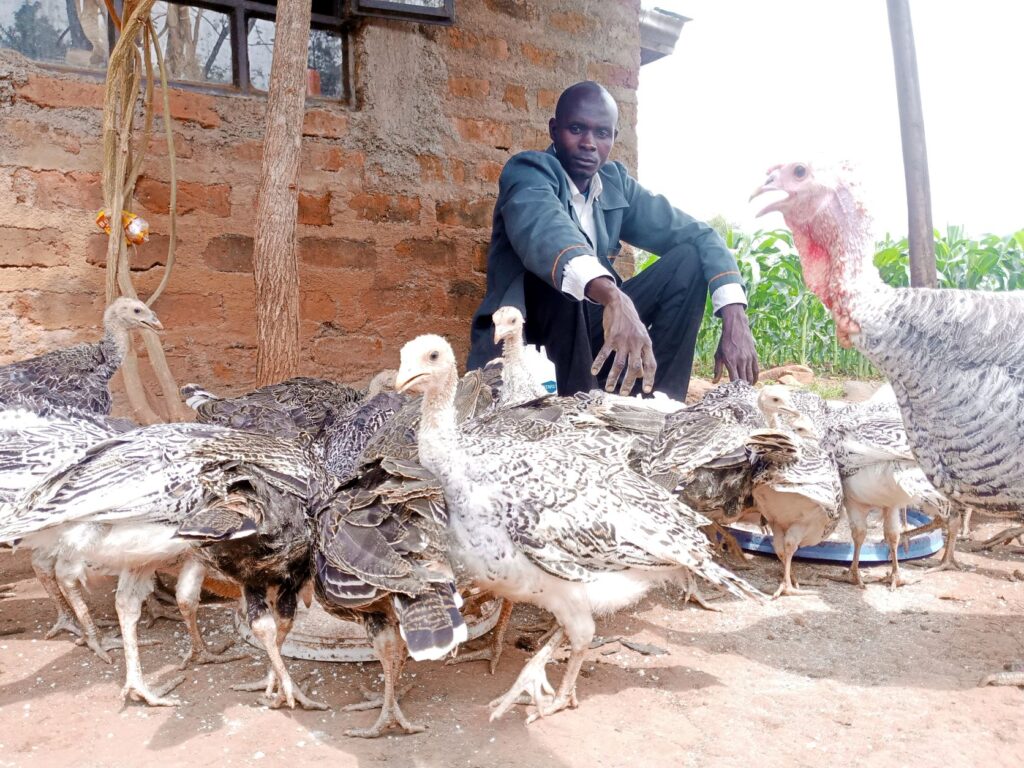
By MN Reporter
When living in Nairobi was tough enough, Bernard Osunga an unemployed Human Resource manager decided to find solace with turkey farming in Migori county.
The 33 years old said he graduated with diploma in 2012 and was employed in mjengo and insurance industry in Nairobi where he used to earn about Sh20,000 a month.
“In 2018 I left employment and started a butchery and fast food business which was picking until Covid disrupted business, I could not manage rent arrears and the debt was mounting,” Osunga said.
He said while his business was worth about a half a million shillings, he sold it off cheaply at Sh110,000 and when he cleared the debts he come to Migori with only Sh30,000.
WATCH PART 1/3 VIDEO BELOW:
“I come home empty handed and started to ask myself what I can do with my life and support my family, I decided to pick up turkey farming as my grandfather used to keep them while growing up,” Osunga said.
He realized that getting the birds was hard which forced him to search for over fifty kilometers to a farmer in nearby Nyatike sub-county.
“I managed to get four birds, one male and three females, that was early last year and since I was tight on money I used to graze them and by April they started laying eggs which gave me room to cut on costs,” he said.
He said with the four he managed to get 40 chicks, as a hen lays 17-23 eggs and he sold off some eggs before incubation at Sh350 per egg to plough the money back to the venture.
“Right now I average over a hundred birds at any given season which has given me a steady means of finance as I start selling off eggs and young chicks across time,” Osunga said.
He said he chose to start turkey farming and kept off chicken farming as the venture was cheaper an has more returns as it rans on low cost.
WATCH PART 2/3 OF THE VIDEO HERE, SUBSCRIBE:
Feeds is the biggest cost of poultry farming, but for turkey 75 per cent of their food is from grass which sees him allow them to graze in the compound.
“Equally while a chicken egg costs Sh20, from turkey it is Sh350-500 an egg. At two months a chicken costs Sh300-400 per bird, while for turkey at the same period it fetches Sh1,500,” he said.
He said a pair of mature turkey costs Sh10,000-15,000, which is much superior that chicken.
Tio add, Turkey being bigger in size they are often used to hatch other poultry eggs like chicken, guinea fowl, geese as they are also better mothers.
Equally, the birds act as alarm system as they cackle and make sounds when strangers walk into compounds.
With turkey farming being rare, Osunga said he often follows tutorial from YouTube and aims to maintain an average of 250 birds per season by December and heavily uses social media to sell his birds apart from word of mouth.
“Honesty was the key to success, my recent market was from a five star hotel in Nairobi where the procurement came and was assured of steady supply from the farm, they buy a kilo of meat at Sh800, which is a plus,” Osunga said.
He said so far he has invested proceeding in building a shop where he plans to open a kiosk.
“I was un-employed and dealing with mounting debts and inflation in Nairobi, when I left for a rural home I found solace in farming of turkey which has made me to be self reliant,” he said.
He said the biggest challenge of turkey farming is avoiding mortality when they are one to six weeks where they are majorly placed indoors and under a heating system.
WATCH PART 3/3 OF THE VIDEO HERE, SUBSCRIBE:
“At this time they feed under chickmash and given a multi-vitamin which is soluble in drinking water for the first three weeks, if hard on cash alovera and pepper boiled together can be an alternative,” he said.
On week four the birds are vaccinated against newscastle disease and on the seventh week a fowlpox vaccine given.
“We also give them anti-biotics to help them in fighting diseases and deworm in three months and start selling them off at two months to maturity,” he said.
He said the turkey venture has made him to stop seeking formal employment which is hard to get and hopes to boost the business further as he has started training groups on turkey farming.
He said wild animals and insecurity are his main challenges, as he uses crashed maize and fresh water shrimps locally known as ochong’a as his feeds.

